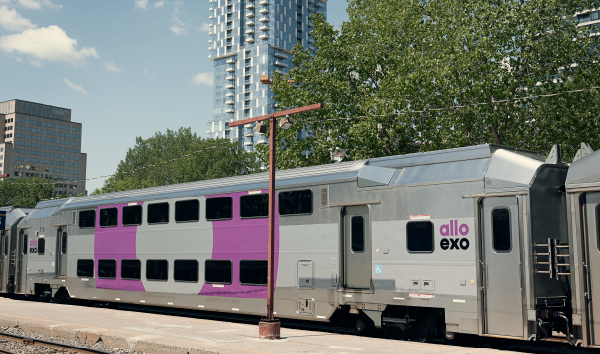Public transit and the environment: a silent revolution

Imagine a world where traffic jams are as old-fashioned as rotary phones, and where clean air isn't just an urban legend. Well, that world isn't so far away thanks to the unsung hero of our daily lives: public transit. On the grand stage that is modern cities, exo wants to play a leading role. Read on as we dive into an exciting world where mobility rhymes with (environmental) responsibility.
Sustainability and public transit: an alliance for the future
Public transit plays a crucial role in the transition towards a more sustainable future. Did you know that in Quebec, transportation is responsible for 43% of greenhouse gas (GHG) emissions? Of this percentage, 64% (of GHGs) comes from road transport, and only 0.3% from exo.1
With growing awareness around the importance of sustainable mobility, exo is positioning itself as a key player with projects aimed at reducing emissions and promoting greener rail technologies. This includes the electrification of transportation and improving access to traffic generators. These efforts align with Metropolitan Planning and Development Plan (PMAD) objectives and the government's sustainable mobility policy, aiming to improve land use planning and promote sustainable mobility.
The environmental impact of public transit: beyond reducing emissions
Exo doesn't just count GHG emissions. In recent years, the organization has undertaken several concrete actions to reduce its environmental footprint.
- Since 2019, the organization has carried out an annual assessment of GHG emissions emitted by its services.
- In 2019, exo also calculated the level of GHG avoided thanks to its public transport services, demonstrating the significant impact its services are having on reducing emissions.
Despite the challenges, exo aims to support this analysis and underline its commitment to environmental sustainability.
Sustainable mobility: urban planning and innovations

Exo's future actions aim to ensure that each project progresses towards a greener future. The organization is committed to incorporating environmental guidelines into its operations to guarantee a sustainable approach to all its projects and activities. These measures include:
- energy-efficient practices for trains,
- the use of biodiesel,
- and the strategic connection of railways to reduce fuel consumption.
The role of public transit in reducing congestion and promoting cycling
Public transit is a major pillar in the fight against climate change. Our activities aim to reduce our daily impact on the environment, by raising awareness among employees and customers of the importance of sustainable mobility. Internal marketing campaigns and education initiatives also play a crucial role in this process. In fact, exo is working in conjunction with BIXI to install self-service bicycles around certain hubs (like stations and terminuses
Aiming for a sustainable future: development and innovations

Exo is working in collaboration with municipalities and other organizations to continuously develop projects and activities related to sustainable mobility. For example, the transition to electric buses is planned in the coming years, marking an important step towards the electrification of transportation. Plus, exo currently complies with environmental regulations for all its projects and activities.
The environment and public transport: answers to the most-asked questions
What’s the impact of transportation on the environment?
The impact of transportation on the environment is considerable, especially in terms of GHG emissions and air pollution. Motorized vehicles, particularly personal cars, are major contributors to CO2 emissions—a major greenhouse gas. They are also responsible for urban air pollution, which can have adverse effects on public health and the environment. Additionally, transportation infrastructure, like road and highway construction, can impact local ecosystems, leading to habitat fragmentation and the alteration of natural landscapes.
How can the environmental impact of transport be reduced?
Reducing the impact of transport on the environment involves several strategies:
Promote public transportation:
using public transportation reduces the number of vehicles on the roads, which reduces greenhouse gas emissions and air pollution.
- Adopt clean modes of transport : electric, hybrid, or alternative fuel vehicles emit fewer pollutants.
- Encourage active mobility : walking and cycling are both ecological means of transportation that contribute to physical health and the reduction of road congestion.
- Develop cities focused on sustainable transportation : urban planning that promotes public transportation and active mobility can significantly reduce the ecological footprint of transportation.
Why promote public transportation?
Promoting public transportation has several environmental and social advantages:
- Reduction of GHG emissions: Public transport (by transporting many people simultaneously) emits up to half as many GHGs as a car.2
- Reduction of pollution and improvement in air quality: Fewer vehicles on the road also means less air pollution.
- Alleviation of traffic congestion: Public transit can reduce the number of cars on the road, which eases congestion and reduces travel time.
- Accessibility and social inclusion: Public transport offers an affordable and accessible mobility option, essential for people who do not own a private vehicle.
When you choose public transit, you’re taking a step towards a more sustainable future. Exo's initiatives demonstrate that every transportation choice has a significant impact on the environment. By promoting more ecological modes of transport, we can all contribute to the protection of our planet. To learn more about exo’s sustainability actions, visit our sustainable development plan.
Like this content?
Sign up for our bimonthly newsletter to get all our inspiring articles and news.
When planning your trips, check your trip planning app to see the many route options available to you.
More news on exo.quebec
